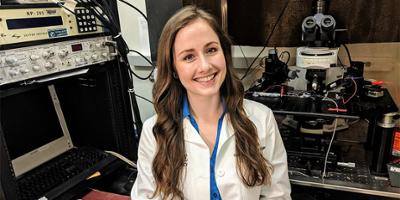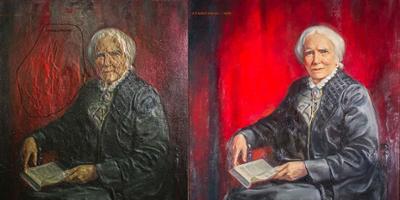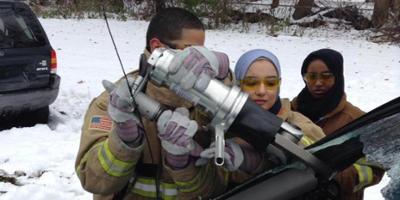Professor wins $300,000 Research to Prevent Blindness Award
Samuel A. Herberg, PhD, assistant professor of ophthalmology, cell and developmental biology, and biochemistry and molecular biology, has been awarded a $300,000 Research to Prevent Blindness (RPB) Career Development Award.
The grant will support Herberg’s glaucoma research that focuses on the trabecular meshwork, an important tissue located in the anterior chamber angle of the eye between the cornea and the iris. The trabecular meshwork regulates the outflow facility of the aqueous humor and thus controls intraocular pressure. Dysfunction of the trabecular meshwork is the principal cause of elevated intraocular pressure that is associated with irreversible vision loss in primary open-angle glaucoma.
The grant comes during a year in which two of Herberg’s papers from his Ruth L. Kirschstein National Research Service Award-supported postdoctoral work in bone tissue engineering at Case Western Reserve University from 2014-2017 were published in key scientific journals: Recapitulating bone development through engineered mesenchymal condensations and mechanical cues for tissue regeneration, in Science Translational Medicine, June 2019; and Combinatorial morphogenetic and mechanical cues to mimic bone development for defect repair, in Science Advances, August, 2019. These studies were instrumental in piquing Herberg’s interest in the emerging field of mechanobiology that centers around understanding the relationship between a cell and its environment and how mechanical forces are being converted into biochemical signals.
Tissue engineering and regenerative medicine, especially for bone, have been key areas of research for Herberg in his earlier career, but with his appointment to the faculty in Upstate’s Department of Ophthalmology and Visual Sciences, the main focus of Herberg’s current work is ocular tissue engineering. While there is significant research being done across the country in the regeneration of eye tissue for such diseases as glaucoma, macular degeneration and cancer of the eye, trabecular meshwork tissue engineering is still in its infancy.
The RPB grant is a big win for Herberg. The Career Development Award is designed to attract young basic scientists to eye research. Others at Upstate who have received the funding are among the top names in vision research internationally, including Eduardo Solessio, PhD; Michael E. Zuber, PhD; Andrea Viczian, PhD; Peter Calvert, PhD; Reyna I. Martinez-DeLuna, PhD.
“I am very grateful to receive this grant and grateful for the support of the department,” said Herberg, who is eager to bring his expertise and research prowess to ocular disease.
Herberg’s challenge in his research is to replicate the delicate tissue meshwork that filters the fluid in the eye. When the trabecular meshwork does not work as it should, fluid builds causing elevated pressure in the eye that can lead to glaucoma.
His goal is to build a three-dimensional model of the trabecular meshwork in his lab that would simulate the composition and architecture of the native tissue, allowing him to investigate the cellular behavior and tissue remodeling behavior as well as to test the effect of pharmacological agents or cellular therapies to restore function of the meshwork. In these efforts, Herberg collaborates with researchers at Duke University, Syracuse University, SUNY Downstate Medical Center, and Wake Forest School of Medicine.
“There are animal models and in vitro models, but neither is very good at replicating the trabecular meshwork under normal as well as dysfunctional conditions,” he said. “Our new model has the potential to advance our understanding of how aqueous humor outflow resistance is modulated on the cellular and tissue level in health and disease.
Herberg was appointed to the Upstate faculty last August. In addition to his post at Case Western Reserve University, he also served as a senior research fellow at Wake Forest School of Medicine. He earned his doctorate from Augusta University (formerly Medical College of Georgia) and his undergraduate degree from the University of Applied Sciences, Darmstadt, Germany.
Caption: Samuel Herberg, PhD, assistant professor of ophthalmology, cell and developmental biology, and biochemistry and molecular biology.





